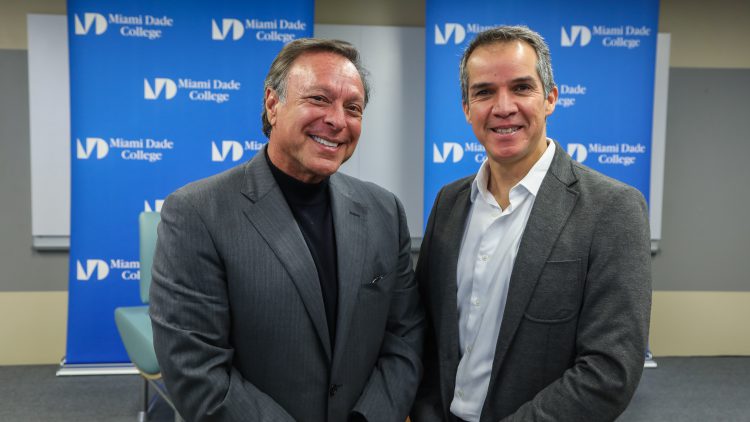A Future Without Wallets
Uber, Airbnb… and Visa?
While it may not seem to fall into the same category as those newer digital disrupters, a top executive for Visa says the credit-card company may have been the first of its kind to create a global empire without owning any physical assets.
“If I tell you to think of a company that owns no assets, that connects millions of people, that charges a small amount every time a transaction is done, you probably think of Uber,” said Eduardo Coello, Visa regional president for Latin America and the Caribbean, who was the latest speaker in the Mike Fernandez Global Leadership Series. “Visa is a technology company that builds software, a network, and then charges a small fee when a transaction goes through that network.”
Hosted by The Idea Center at Miami Dade College, Wolfson Campus, the Mike Fernandez Global Leadership Series features distinguished corporate executives who share their knowledge of best practices and emerging trends in their industries. The series kicked off in 2017 with PepsiCo Latin America CEO Laxman Narasimhan, IBM Chief Innovation Officer Dr. Bernard Meyerson and Boeing Latin America President Donna Hrinak.
Coello’s presentation, “Connecting the World and Shaping the Future of Commerce,” explored innovative steps the 60-year-old company is taking to transform the way customers make payments. The aim is to increase the efficiency and security of financial transactions while maintaining the trust of merchants, consumers and financial institutions that partner with Visa.
“Visa has more than 30,000 transactions per second,” Coello said. “Trust is key. Consumers need to trust their payment will go through and merchants need to trust they will be paid.”
Visa, the world’s largest electronic transaction network, partners with 16 million financial institutions to serve 3.2 billion cardholders and 40 million merchants in 200 countries and territories worldwide.
Although half of all transactions in the United States are still made with cash, Coello said Visa is prepping for a more efficient, cashless future. Connected devices are key to that vision.
While many people already use smartphones, Visa is envisioning a future when consumers will make payments through connected cars, home appliances and accessories. A connected car on showcase at the Visa Innovation Center in Miami – one of five global innovation centers testing new payment technologies – would allow users to make car-related purchases, such as paying for gas or parking, from their seat without ever opening their wallet.
Although the connected car is still more of a concept than a reality, Visa is unveiling a new, convenient wearable payment device at the 2018 Winter Olympics in South Korea: connected gloves.
“We all know it’s inconvenient to take off your gloves when it’s cold outside,” Coello said. “Now you can wave your gloves in front of the credit-card machine and pay that way.”
